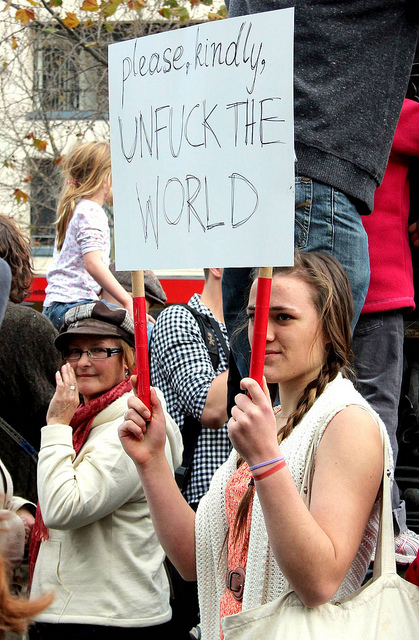
takverThis young lady elegantly summarizes the request.
Everyone wants a carbon tax. Literally everyone. I just did a poll of my house and my dog Lucy kind of nodded slightly, so I feel confident in saying that 100 percent of Americans support a carbon tax (margin of error, 100 percent).
Really, it isn’t just me and my dog. (Actually, I’m kind of iffy on it, but I’m willing to hear the dog’s arguments.) Here is who else wants a carbon tax, according to Corporate Climate Comminqués, a project of Cambridge University: BP. Shell. British Airways. ING. Kodak. Ricoh. Unilever. That’s literally every major corporation in the world (margin of error, like, 90 percent).
To be fair, they don’t all support a carbon tax. They, in the words of the document, “urge policy-makers to focus on introducing a clear carbon price framework in a stable and timely manner.” Which includes requesting that leaders:
- Make carbon pricing a central part of national policy responses.
- Work towards the long term objective of a carbon price throughout the global economy.
- Set sufficient ambition through internationally agreed targets to drive change at a pace commensurate with the 2°C goal.
The group admits that the idea is “contentious,” but “experience has shown that carbon pricing as an approach can deliver greater emissions reductions at lower cost than predicted which in turn offers the opportunity for greater ambition.” Great.
The release of the document and signatories is timed to coincide with the world’s foremost annual gathering of dispassionate futility, the Pro Bowl annual U.N. climate conference, held this year in Qatar. (It is estimated that eliminating this annual conference would reduce millions of pounds of carbon dioxide emissions from airplanes and save thousands of trees sacrificed to print hundreds of thousands of white papers. Margin of error on that data? Zero percent.)
The document is less about governments leaping to action than it is about standardizing market-based remedies for carbon pollution. While various solutions to climate change exist around the world, and there are burgeoning partnerships between competing efforts, a global, unified solution to the problem would facilitate the creation of a massive, global marketplace — which would not only make the market more efficient, it would make it more useful for its goal, since carbon emissions tend to ignore national boundaries.
Which brings us to our final point. My initial survey of Americans was off slightly. There is at least one American who doesn’t want a carbon tax, and hasn’t shown any great predilection toward instituting any sort of carbon price control: Barack Obama.
That is why I strongly encourage you to vote for my dog for president in 2016. She isn’t qualified under the Constitution, but she’s got some pretty good ideas. Assuming that the problem hasn’t been fixed by then, which it won’t have been.
Lucy 2016.



